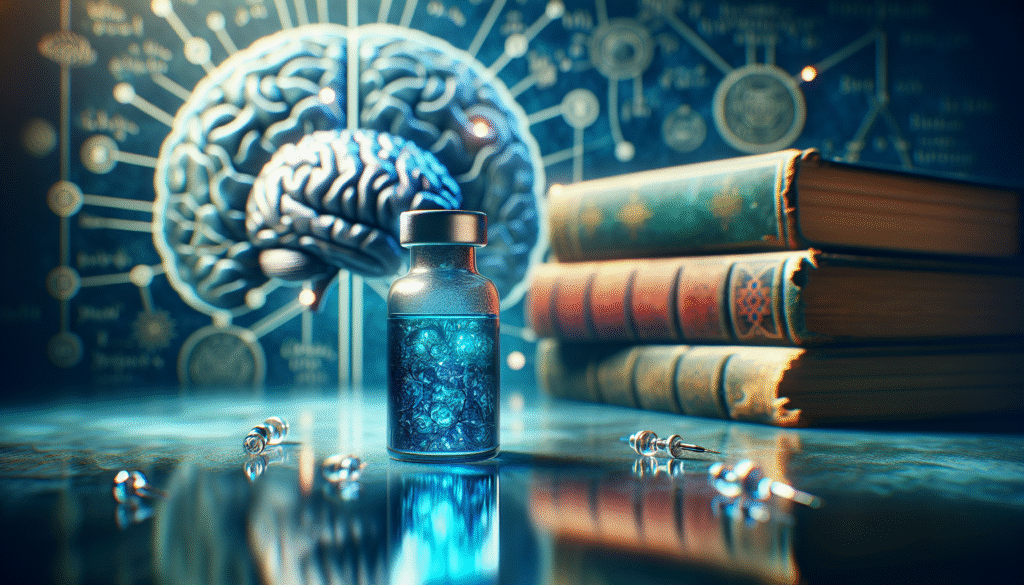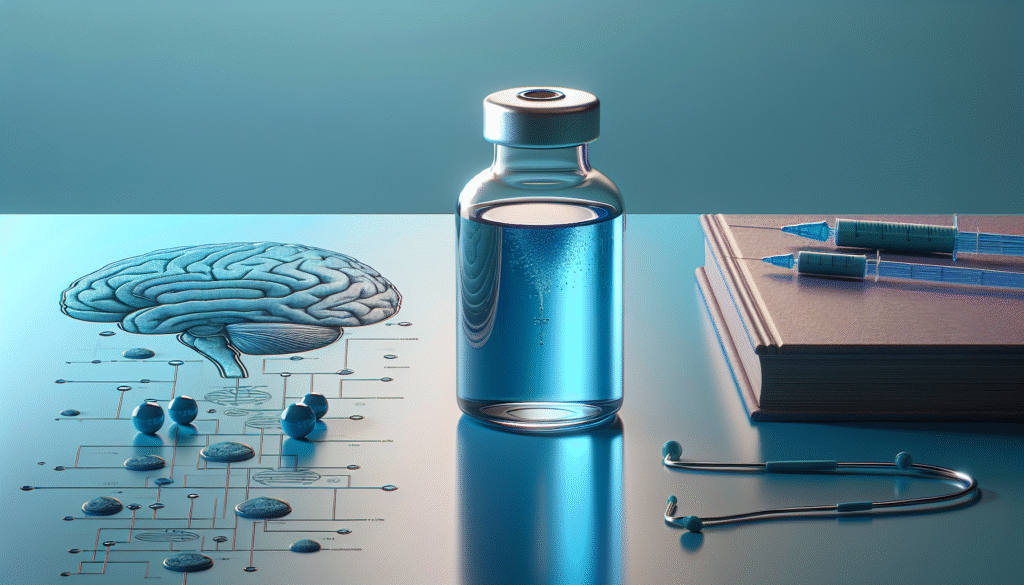
What if a simple dye could potentially sharpen your mind and enhance your ability to solve complex problems?
Understanding Methylene Blue
Methylene blue, a synthetic dye with historical roots in medicine, has garnered attention in recent years for its diverse applications beyond its traditional use in biological staining. Originally developed in the 19th century, it is now regarded as a compound of interest in various fields, including neuroscience, pharmacology, and even art. But could this compound also play a role in enhancing your cognitive abilities, particularly your problem-solving skills?

The Chemistry of Methylene Blue
Methylene blue is a thiazine dye that appears as a vibrant blue in its oxidized form. When reduced, it becomes colorless. Its chemical formula is C16H18ClN3S, and it is soluble in water, which allows it to easily interact within biological systems.
Mechanism of Action
Methylene blue functions primarily through its role in redox reactions — being reduced and oxidized within cells. This characteristic positions it as a potential neuroprotective agent, influencing several biological pathways. Its ability to cross the blood-brain barrier opens avenues for its use in treating neurodegenerative diseases and potentially enhancing cognitive performance.
The Research Landscape
Although much of the existing research on methylene blue has focused on its medicinal properties, recent studies have begun to shed light on its cognitive enhancement potential.
Studies on Cognitive Function
A study conducted on animal models indicated that low doses of methylene blue could improve memory and cognitive flexibility. The researchers observed that it positively influenced mitochondrial function, which is essential for energy production in brain cells. Enhanced energy production may result in improved cognitive performance, suggesting that this compound could be beneficial for individuals engaged in complex problem-solving tasks.
Cognitive Functions and Problem-Solving
Before diving deeper into how methylene blue may enhance your problem-solving skills, it’s essential to understand the cognitive functions involved in effective problem resolution.
Key Cognitive Functions
Cognitive functions encompass a range of mental processes. Here, we focus on those particularly relevant to problem-solving:
| Cognitive Function | Description |
|---|---|
| Attention | The ability to focus on relevant information while ignoring distractions. |
| Memory | Storing and recalling information necessary to solve problems. |
| Critical Thinking | The ability to analyze information and make reasoned judgments. |
| Creative Thinking | The capacity to think outside the box and generate innovative solutions. |
| Decision Making | Evaluating options and choosing the best course of action. |
These cognitive skills underpin your capacity to approach and resolve challenges effectively. If methylene blue can enhance any of these functions, it may offer a viable means of improving your problem-solving skills.
Methylene Blue’s Effect on Cognitive Functions
Enhancing Attention and Focus
One of the first cognitive processes that methylene blue may affect is attention. Studies suggest that improved mitochondrial function can lead to increased neuronal firing rates, thereby enhancing your ability to maintain focus on tasks.
Improving Memory Retention
Methylene blue has been shown to have a positive effect on memory retention. In studies involving older adults, the compound facilitated the creation and retrieval of memories, which play a crucial role in problem-solving scenarios where recalling relevant information is vital.
Fostering Critical and Creative Thinking
While the direct impact on critical and creative thinking requires further exploration, there are indications that enhanced brain function can lead to more efficient cognitive processing. In environments where innovation is crucial, an improved baseline cognitive function may contribute to more effective brainstorming and analysis.

Safe Use of Methylene Blue
Though the potential benefits of methylene blue on cognitive performance are intriguing, it is essential to consider its usage and safety.
Recommended Dosage
Current research suggests that lower doses of methylene blue, typically in the range of 0.5 to 4 mg/kg, may induce cognitive benefits without adverse effects. However, individual responses can vary, and it is crucial to consult a healthcare professional before considering any supplementation.
Possible Side Effects
While generally regarded as safe at low doses, methylene blue can pose risks of side effects in higher concentrations. Common side effects include:
| Side Effect | Description |
|---|---|
| Headaches | Mild to moderate headaches may occur, particularly at higher doses. |
| Nausea | Some users report gastrointestinal discomfort, including nausea and vomiting. |
| Urinary Changes | It can cause changes in urine color, making it blue or green due to excretion. |
| Allergic Reactions | Rarely, individuals may experience allergic reactions, which require immediate attention. |
Cognitive Enhancement in Context
The quest for cognitive enhancement is not new. Many individuals seek ways to improve their mental capabilities for various reasons, ranging from academic performance to professional productivity. With such demands in modern society, it is vital to explore safe and effective avenues for augmentation.
Comparing Methylene Blue to Other Cognitive Enhancers
Numerous substances have been touted for their cognitive enhancement properties. Below is a comparative overview of methylene blue against some popular alternatives:
| Substance | Potential Benefits | Known Risks |
|---|---|---|
| Methylene Blue | Improved focus, memory retention | Side effects at high doses |
| Caffeine | Increased alertness | Dependency, jitteriness |
| L-Theanine | Stress reduction, improved focus | Generally safe but may vary |
| Adderall (Amphetamine) | Enhanced focus, productivity | Dependency, cardiovascular issues |
| Modafinil | Alertness, prolonged focus | Headaches, potential side effects in some |
Every substance has a unique profile, and effectiveness can vary from person to person. Methylene blue stands out for its potential neuroprotective properties alongside cognitive enhancement.

Real-World Applications
What does the potential of methylene blue mean for you in everyday life? Understanding its advantages could help you integrate this compound into your routine for potentially improved cognitive functionality.
Academic and Professional Settings
In the academic landscape, the ability to retain information and apply it effectively to problem-solving tasks is paramount. Methylene blue’s implications in enhancing memory and focus may lend students and professionals increased confidence and performance.
Creative Industries
For those in innovation-driven industries, where creative thinking is essential, a boost in cognitive flexibility can lead to novel ideas and solutions. Higher cognitive function may result in novel breakthroughs that redefine the boundaries of creativity.
Conclusion: A Step Towards Enhanced Problem-Solving
While the application of methylene blue as a cognitive enhancer is still an emerging field, the initial research findings present a compelling case for its potential benefits. By improving critical cognitive functions such as memory, attention, and creative thinking, methylene blue could significantly impact how you approach complex problems.
Before considering its use, reflecting on the implications, ensuring a thorough understanding of dosage and safety guidelines, and consulting with a healthcare professional is prudent. If incorporated thoughtfully into your routine, methylene blue might just serve as a catalyst in enhancing your problem-solving skills — empowering you to tackle challenges in life with renewed vigor and confidence.
Some aspects of cognitive enhancement are still layered with uncertainties, and as with any substance, the effects can vary significantly among individuals. Therefore, embracing a holistic approach to cognitive development — balanced with mental exercises, healthy lifestyle choices, and neuroprotective practices — may yield the best outcomes in sharpening your problem-solving capabilities.
